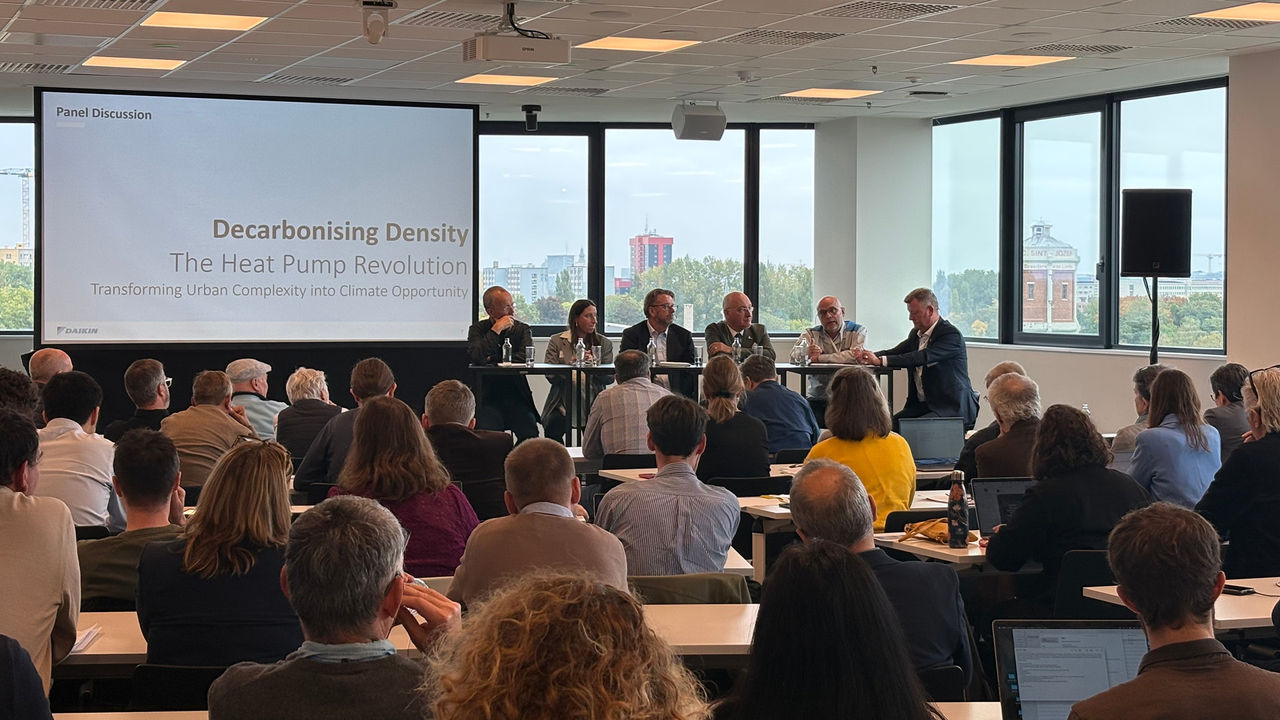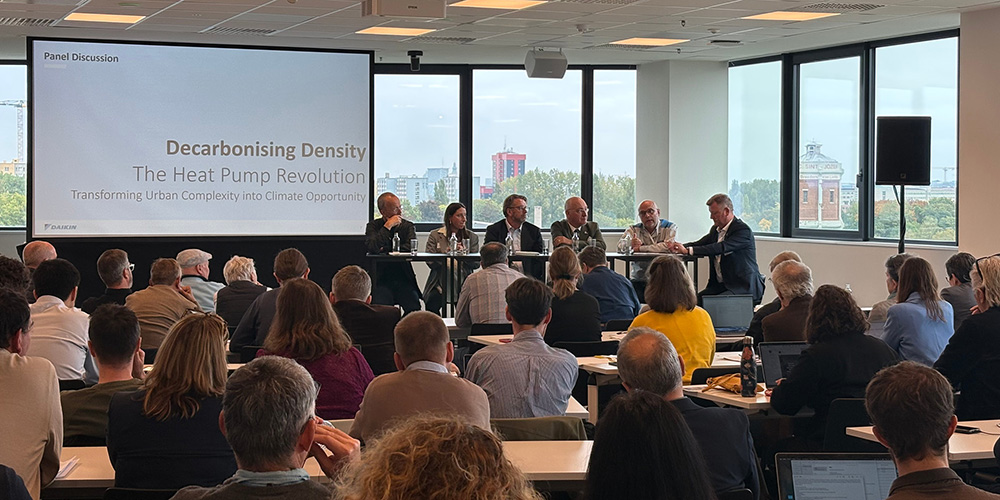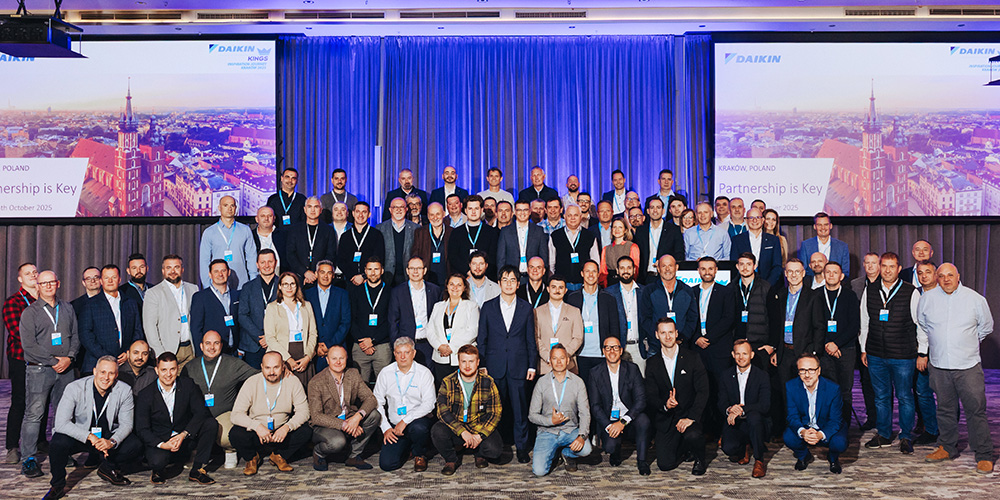
Corporate news / Vienna, Ghent, 17 November 2025 – At a recent media event at Daikin Europe's new Research and Development Center (EDC) in Ghent, Belgium, experts from policy, academia, industry, and technology discussed turning urban challenges into climate opportunities, highlighting the key role of heat pumps.
Expert talk
Daikin hosted a panel discussion under the motto "Decarbonizing density: The heat pump revolution" moderated by Patrick Crombez (Head of Environmental Readiness at Daikin Europe, and President European Heat Pump Association), featuring Filip Watteeuw (Alderman Climate and Energy at the City of Ghent), Michel De Paepe (Professor Applied Thermodynamics and Heat Transfer at Ghent University), Aurélie Beauvais (Managing Director of Euroheat & Power), Peter Anderberg (CEO and founder of HEATNET Global) and Laurent Van Thournout (Deputy General Manager EDC at Daikin Europe). This summary outlines the speaker’s views shared during the panel discussion.

Dense urban areas: powerful engines for low-carbon transformation
Although urban environments are characterized by complexities such as fragmented property ownership, aging infrastructure, regulatory constraints, and high energy demand, cities continue to serve as powerful drivers of low-carbon transformation. Urban density is not a barrier but rather a strategic asset, facilitating the deployment of efficient infrastructure, the implementation of shared heating systems, and the advancement of scalable innovations that can collectively accelerate emissions reductions and enhance quality of life.
Urban areas concentrate people, buildings, and services, making them ideal for clean energy individual or collective heat pump-based solutions such as district heating and cooling or smart retrofitting. Dense cities offer an opportunity to accelerate zero-emission buildings and climate-resilient infrastructure by aligning policy, technology, and finance. This includes not only single family homes but also municipalities’ own public and social housing, offices, commercial spaces, buildings with mixed residential and commercial purposes, data centers, warehouses, or hospitals, many of which have significant heating and cooling needs.
Key takeaways from the panel discussion
- Heat Pump technology evolution: Over the past decade, heat pump systems have advanced in efficiency, refrigerants, and digital controls. Their ability to both heat and cool using renewable electricity makes them central to urban decarbonization goals.
- City of Ghent’s approach: Ghent’s strategy includes supporting installer training, stimulating market growth, improving the customer journey, and forming strategic alliances with industry and academia.
- Public-private partnerships: Effective decarbonization requires alignment of policies, incentives, technical standards, and shared innovation between municipalities and private companies.
- Retrofitting existing buildings: Cities can minimize disruption by using modular, easy-to-install heat pump systems and supporting both centralized district heating and decentralized, building-level solutions.
- Financial & policy incentives: Grants, tax credits, streamlined regulations, and educational outreach are critical for encouraging large-scale retrofits, especially in older or historical buildings.
- Transitioning to green skills & workforce development: There is a pressing need to bridge the skills gap through updated curricula, apprenticeship programs, industry partnerships, and lifelong learning to meet growing demand for green jobs.
- “Low-hanging fruit” solutions: Wider adoption of air-to-air heat pumps, streamlined permitting, and increased public awareness are seen as immediate opportunities for accelerating decarbonization. City of Ghent’s Alderman is considering establishing a climate company, helping stakeholders to make the move to low carbon heat pump heating.
Speaker highlights
Filip Watteeuw, Alderman Climate and Energy, City of Ghent
Ghent’s goal is clear: By 2050, all homes must be heated without fossil fuels, guided by the “Gentse Warmtevisie”. At the panel he outlined several best practices of the City of Ghent:
- Stimulating market growth by encouraging more installers and expanding options for residents.
- Supporting installers with training to boost their confidence and expertise in recommending and fitting heat pumps.
- Improving the customer journey by providing transparent quotes and guidance for homeowners, reducing uncertainty and building trust.
- For climate justice, energy-efficient social housing is the best integrated tool in the fight against (energy) poverty. That’s why Ghent gives additional resources for the social housing company ‘Thuispunt Gent’ to accelerate the transition to fossil-free social housing.
- Collaboration is key and strategic alliances with Daikin and UGent help driving innovation and adoption.
A low hanging fruit is to look at how to accelerate electrification, and manage grid demand-response and pricing so vulnerable groups can be supported to get everyone on board: Electrification will accelerate to achieve CO₂ reduction targets by 2030 and 2050. This requires substantial investments in local production, storage, and smart control to guarantee a reliable energy grid. The City of Ghent is investigating how energy savings and smart infrastructure management can limit peak consumption, reduce costs, and support vulnerable target groups. In collaboration with the grid operator, Ghent is striving for a resilient, affordable, and fair energy system.
“We are shifting from large, centralised systems to a decentralised, green energy approach. By comparing the costs and the benefits of central and local systems - such as shared geothermal networks and individual heat pumps - we aim to identify the most efficient and fair path forward. This transition promotes co-ownership, community heating, and collaboration with knowledge institutions and private partners, making fossil-free heating faster, more affordable, and inclusive." Filip Watteeuw, Alderman Climate and Energy, City of Ghent
Aurélie Beauvais, Managing Director Euroheat & Power
Aurélie Beauvais examined the financial and regulatory environment, advocating for strong policy measures such as grants, tax relief, affordable loans, and simplified rules to drive retrofitting –particularly in older and heritage properties. She emphasized that education and awareness campaigns are vital to dispel misconceptions and boost uptake. Additionally, she pointed out that well-supported local heating and cooling strategies are key to speeding up the implementation of sustainable district energy networks, highlighting the need for adequate financial and human resources for local authorities.
She deplored the negative impact of fluctuating regulations, which raise investment costs and make it harder for local governments and operators to secure funding. Aurélie proposed that heating strategies should be insulated from day-to-day political changes, underpinned by cross-party consensus, to ensure consistent policies and foster confidence among all those involved in the transition.
As for easily achievable opportunities, Aurélie underlined the vast potential of waste heat recovery to rapidly reduce reliance on fossil fuels for heating and cooling. With existing technologies – such as large-scale heat pumps and district heating and cooling systems – this readily available resource could be harnessed on a much wider scale. Recent research estimates that surplus heat accessible within the EU totals 2,860 TWh per year, which matches the entire energy demand for heating and hot water in EU residential and service sector buildings. The forthcoming EU heating and cooling strategy, anticipated in spring 2026, could provide significant momentum for unlocking this opportunity.
“If we want to accelerate the energy transition in Europe, we need stable policies. Crucially, these policies should be backed by broad cross-party consensus, ensuring that progress is not derailed by political cycles or changes in government. Only with clear, enduring rules and well-supported local authorities, can we make sustainable heating and cooling accessible to everyone.” Aurélie Beauvais, Managing Director Euroheat & Power
Peter Anderberg, Founder and CEO HEATNET Global
Peter Anderberg emphasised the need for a mix of centralised (district) and decentralised (building-level) solutions, with modular heat pump systems that minimise disruption during retrofits. He championed co-ownership models and community heating initiatives to overcome barriers and speed up the transition. Fast-tracking green skills development is vital, requiring scalable training programmes, support for SMEs, and public-private partnerships.
His low hanging fruit advice: Start with your home. Reducing heating consumption is like a weight-watcher program. Measure where you are and set a target. 5% by Christmas, another 5% by Easter. There are plenty of solutions which are not difficult nor expensive to implement. Hard to start, buteasier once you see results. And it’s not about starving or freezing. It’s about becoming aware. Peter Anderberg also believes the industry must think differently about product development.
“Manufacturers should focus on simplicity, standardizing parts, and adopting modular designs. As I often say, we need a ‘LEGO’ mindset: energy systems should be made up of ready-to-use modules that fit together easily, even for non-experts. This cuts down on errors, which is especially important in the UK where poor installations have hurt heat pumps’ reputation. Every time a system is installed incorrectly, it makes the headlines, leading people to think, ‘I’d rather not have a heat pump’. Innovation shouldn’t just be about the product, but about the process. How can we make it simpler, cheaper and less dependent on consultants? I believe more ‘copy and paste’ and less complexity is the key to really accelerating development.” Peter Anderberg, Founder and CEO HEATNET Global
Professor Michel De Paepe, Professor of Thermodynamics at UGent
Professor Michel De Paepe highlighted the remarkable advancements in heat pump technology over the past decade, including efficiency gains, improved refrigerants, and digital controls. He stressed that heat pumps’ ability to both heat and cool using renewable electricity makes them crucial for urban decarbonization. Their versatility means they can be integrated into any kind of building, supporting city-wide climate goals. The skills gap remains a pressing challenge, making education and training in technical, digital, and interdisciplinary fields more important than ever.
Patrick Crombez, Daikin Europe & President European Heat Pump Association (EHPA)
As moderator of the panel discussion Patrick set the scene by emphasizing that cities, with their dense populations and infrastructure, are not just part of the climate challenge but are central to the solution. He underscored the importance of leveraging urban density for efficient deployment of heating and cooling technology and highlighted the collaborative spirit of the panel, covering policy, technology, and real-world solutions.
“Transitioning to net zero heating and cooling is not a question of ‘if’, but ‘how fast’. Europe has the tools – now it’s about accelerating deployment, together.” Patrick Crombez, Daikin Europe & President European Heat Pump Association (EHPA)
Laurent Van Thournout, Deputy Managing Director at Daikin Europe Research & Development Center (EDC) Ghent
Laurent Van Thournout, referred to Daikin’s broad product range, diverse types of heat pumps: from air-to-air, air-to-water, water-to-air, and water-to-water heat pumps – they can all be the right solution for a specific building context, whether for single family homes, commercial buildings or collective housing. He argued that flexibility is essential, as urban environments require diverse solutions. R&D will continue to drive innovation, focusing on modular, interoperable technologies and digital platforms that enable both district and decentralised systems to coexist efficiently.
His low hanging fruit advice is to make more use of air-to-air heat pumps (air conditioners) for heating. Especially in mid-seasons these are very energy efficient, low carbon heating solutions. Another mind-set he sees as important is to “just do it”: develop, experiment and identify scalable solutions. For this, Daikin sees great benefits in cooperating with cities like the city of Ghent, as they are an ideal testing ground for this.
“Urban heating and cooling solutions demand flexibility and innovation. By developing modular, interoperable heat pump technologies and digital platforms, we can adapt to any city’s unique needs. Collaborating with cities like Ghent allows us to experiment, refine, and scale solutions that accelerate the transition to low-carbon living.” Laurent Van Thournout, Deputy Managing Director at Daikin Europe Research & Development Center (EDC) Ghent
Copyrights pictures: Daikin
About
100+ years Daikin
The story of Daikin has always been shaped by groundbreaking ideas, technological innovations, and dedicated people. It began in 1924 when the young Japanese engineer Akira Yamada founded an enterprise in Osaka to manufacture aircraft radiators with a 15-member team. More than 100 years later, the Daikin Industries group brings future-proof solutions for heating, cooling, ventilation, air purification, and refrigeration (HVAC-R) to global markets. 103,500 employees in 173 countries continue the company's legacy of leading technologies to advance low carbon heating and cooling, while ensuring the highest level of comfort.
Read more on 100 Years Daikin
Daikin Industries Ltd.
Daikin Industries is a global leader in heat pump, air conditioning and air filtration technology, employing more than 103,500 people. Founded in Osaka in 1924, it is the only manufacturer in the world that develops and manufactures HVAC-R equipment, compressors and refrigerants in-house. Daikin has been recognized as one of the world’s top 100 most innovative companies by Clarivate (UK) and LexisNexis (USA) for its leadership in technology research and intellectual property patents. For its fiscal year 2024 (1 April 2024 – 31 March 2025) Daikin reported a record sales result of 28,98 billion euro sales.
Read more on www.daikin.com
Daikin Europe N.V.
The Daikin Europe group is a leading provider of heating, cooling, ventilation, air purification and refrigeration technology across Europe, the Middle East, and Africa. Daikin Europe caters to a diverse customer base within the region by designing, manufacturing, and marketing an extensive range of products, maintenance services, and turnkey solutions tailored for residential, commercial, and industrial applications. The group employs over 13,800 people across more than 56 subsidiaries and operates 15 manufacturing sites in Europe (12), Turkey (1) and the Middle East (2). Refrigeration products from Daikin include the brands Daikin, Tewis, Zanotti, Hubbard, and AHT. Headquartered in Ostend, Belgium, for over 50 years, the Daikin Europe group is a subsidiary of Daikin Industries Ltd.
Read more on www.daikin.eu
Daikin Airconditioning Central Europe
Daikin Airconditioning Central Europe, founded in 1999 with its headquarters in Vienna, Austria, operates as a subsidiary of Daikin Europe. Its portfolio includes products and total solutions for heating, cooling, ventilation, air purification, and refrigeration in residential, commercial, and industrial settings. With over 700 employees and 3,400 partners, the company manages sales and service activities across 16 countries in Central and Eastern Europe, including Austria, Albania, Bosnia and Herzegovina, Bulgaria, Croatia, the Czech Republic, Hungary, Kosovo, Montenegro, Moldova, North Macedonia, Poland, Romania, Serbia, Slovakia, and Slovenia.
With 'Your Daikin World' at the Vienna headquarters and the 'Daikin Inspiration Park' in Warsaw, the HVAC-R industry and the construction sector have access to two state-of-the-art B2B-experience centers for co-creating customized solutions for hotels, retail, offices, and large commercial applications. Daikin runs ten out of 141 B2B-training centers across the EMEA region in the CE-region. Consumers and homeowners receive consultations at four B2C-Experience centers in Vienna, Belgrade, Bratislava and Budapest.
Read more on www.daikin-ce.com
General media contact
Doris Passler
Manager Corporate Communications Central Europe
Daikin Airconditioning Central Europe HandelsgmbH
Lemböckgasse 59/1/1, 1230 Vienna, Austria
T: +43 (0) 664 24 56 444
M: passler.d@daikin.at
Specific media contacts
For Filip Watteeuw, City of Ghent. Media contact: De Meulenaere Jesse, jesse.demeulenaere@stad.gent and Sabine Van Belle, Sabine.VanBelle@stad.gent
For Professor Michel De Paepe, UGent. Media contact: Michel De Paepe
For Aurélie Beauvais, Euroheat & Power. Media contact: Diana El Malaki Hossain, de@euroheat.org
For Peter Anderberg, HEATNET Global. Media contact: peter.anderberg@heatnetglobal.com
For Patrick Crombez, Daikin Europe & President EHPA and Laurent Van Thournout Daikin Europe: Media contact: Sap Sofie, sap.s@daikineurope.com
-
 20251117_Daikin-panel-discussion-on-decarbonizing-density-and-heat-pump-revolution_DACEPDF | 446.71KB
20251117_Daikin-panel-discussion-on-decarbonizing-density-and-heat-pump-revolution_DACEPDF | 446.71KB -
 20251117-Bios-speakers-at-Daikin-Europe-EDC-Ghent-panel-discussionPDF | 375.31KB
20251117-Bios-speakers-at-Daikin-Europe-EDC-Ghent-panel-discussionPDF | 375.31KB -
 PR2511_Decarbonising_density_header_image_16x9JPG | 461.36KB
PR2511_Decarbonising_density_header_image_16x9JPG | 461.36KB





